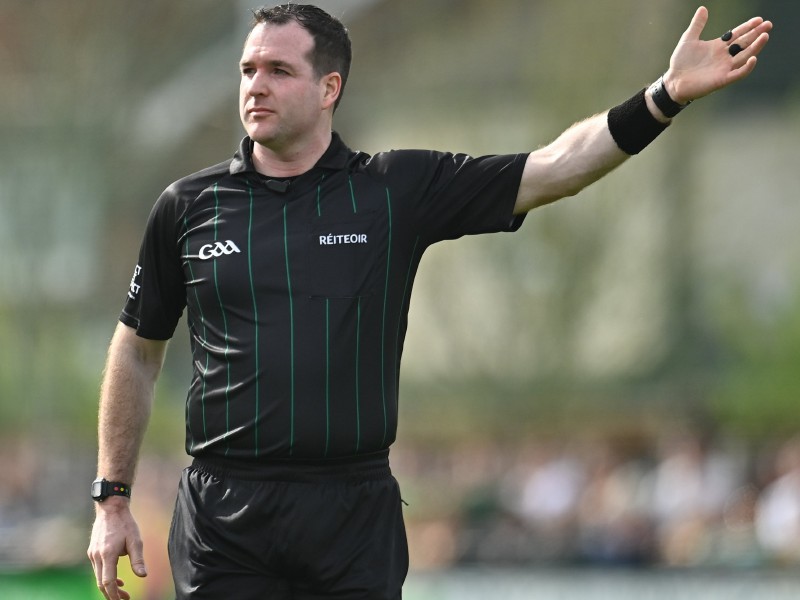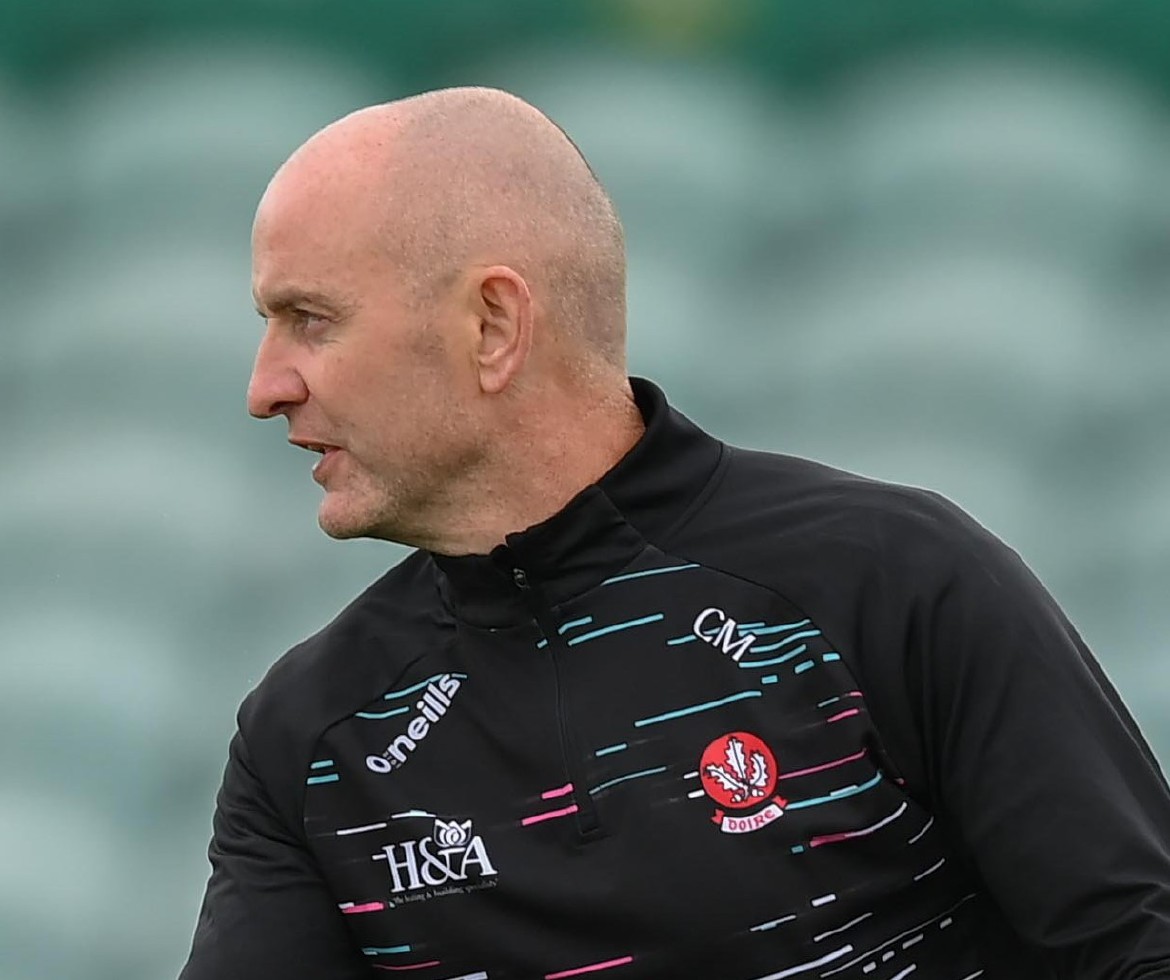By Michael McMullan
A LEADING GAA coach has called for referees to receive more support to help them develop with the Association benefiting in the long-term as a result.
Former Tyrone player Ciaran Meenagh, who is current Derry manager Rory Gallagher’s right-hand man, strongly insists he has no gripe with referees as a whole.
However, if officials receive “proper reimbursement” and an opportunity to prepare like the top players, the Loughmacrory man believes it would be a price worth paying by the GAA for a healthier product overall.
Having coached winning teams at club, school and county level, Meenagh strongly outlines the extra mile players go in search of the extra inch that often separates success and defeat.
While he feels referees need to be afforded the chance to prepare accordingly, there is a “wider” issue that needs considered given the number of fully paid staff at different levels across the association.
“People who referee, for me, I’d have more respect for them than I would have for a lot of people involved in the Association…it is not a very glamorous role,” Meenagh said.
The overall improvement doesn’t just hinge on the officials themselves, but the “more strategic problem” is within the Association.
Meenagh is calling for proper expenses, a proper opportunity to train and a proper level of accountability.
“I have been involved with club and now with county football (management)…the work that goes into performance, preparation, training and all the rest of it is absolutely mammoth,” said Meenagh, who feels the game has never been healthier in terms of quality.
He accepts some games have a defensive element to them, but hails the skill level of players and the overall spectacle rolled out.
“Now, games are coming down to the finest of fine margins… hinging on one or two incidents and, quite often, they are coming down to refereeing decisions,” he said.
Meenagh feels the standard of county refereeing is “very, very good”, but club referees need to be afforded the same chance to develop.
Heavily involved in his own club in Loughmacrory and now in Derry, he watches a considerable amount of football and feels club referees – and the Association as a whole – would benefit from more investment.
“One thing the GAA would benefit from would be if they put more money into improving the quality of the refereeing,” Meenagh said, pointing out that referees get paid a “pittance” with their expenses hardly more than covered.
“Secondly, to have people paid full time – as opposed to other roles – and their remit is to improve the standard of refereeing,” he added.
“They would get well paid for that as well. I know that’s an extra expense in a voluntary association, but, in my opinion, it would improve the Association greatly.”
Meenagh insists he speaks for many coaches in the game of his bug bear with the standard of refereeing. He once again stresses it’s not the fault of referees themselves who are making vital decisions in high pressure environments. Like anyone in any walk of life, officials need every chance to develop.
“The amount of power and pressure on their shoulders, this is staring us straight in the face….I just feel it makes common sense,” he said.
“The way teams are set up; the way management teams know each other and the way teams are prepared, the games are coming down to very fine margins,” Meenagh added, referring to key moments often occurring in the closing stages.
It demands the highest level of preparation to be in the best position to make the correct call.
The big picture is to improve the standard across a wider base with a drive to recruit more officials. It’s something that has already started with clubs always on the lookout for new referees. Meenagh agrees with the ‘give respect, get respect’ mantra, but points to the second element it encapsulates.
“The other 50 per cent is a serious drive in how to respect officials better,” Meenagh said, while highlighting how he enjoys chatting about the game with referees.
“They are good solid, civil, genuine GAA men,” he said. “They are keen to talk football, but, no different to anyone in their work, they need to be given an opportunity to train and for professional development.
“They are not financially well enough rewarded to entice enough into the game and they don’t have enough opportunity to improve.”

ALL IN…Monaghan referee Martin McNally beleives everyone in the GAA has a role to play to help with respect towards officials
Meenagh also agrees with comments made by referee Martin McNally in an interview with Gaelic Life earlier this year.
Speaking after a referee was assaulted in Roscommon, the Monaghan whistler saw the incident the minority, but stressed that stamping out such incidents was something the entire GAA membership needed to take ownership of.
“I am a person who has worn many hats,” said McNally, who is part of Seamus McEnaney’s management with Corduff’s league and championship winning team this year.
“I know what it is like. We all need to step up to the plate and we all have a role to play here,” McNally added in relation to the level of respect needed.
“That’s the nail on the head,” said Meenagh. “There has to be a respect element, but with the respect there has to be an improvement in the standards.
“You can’t have a serious drive for respecting officials without a serious drive from the association for improving the quality of the officiating; otherwise you won’t get it the other way.”
Meenagh admits his own club have turned around discipline issues and brought in a no-matter-what need for respecting officials.
“When you get into the habit of doing that, it stands you in good stead in the long run,” he said.
“When it comes down to the nitty gritty of big championship games, you have ones going mad along the line and putting pressure on the referee on every decision, but it’s harder for people to carry on like that if the quality of the officiating is better.”
County referees get access to the top level training, like their elite playing counterparts and it gives them the best chance to getting the big calls right.
While the same environment is not there for the average club referee, Meenagh feels they should have their expenses doubled to entice people to take up the whistle.
“Then, if it attracts the wrong people and you have proper systems for accountability and they are not good referees, they won’t progress anyway.”
Receive quality journalism wherever you are, on any device. Keep up to date from the comfort of your own home with a digital subscription.
Any time | Any place | Anywhere












